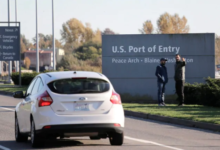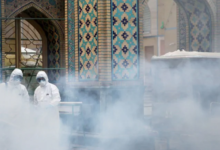U.S. admits border officers wrongly detained Iranian-born travellers at Canada-U.S. border
The top official with U.S. Customs and Border Protection has admitted border officers wrongly held and interrogated Iranian-born travellers — many of them Canadian and American citizens — at the Canada-U.S. border after military tensions with Iran escalated last month.
“That was not in line with our direction and so that was immediately corrected,” said Mark Morgan, CBP’s acting commissioner, on Tuesday.
“We do not target anyone based on their nationality, race, creed.”
The statement comes after CBP denied for weeks that it had detained Iranian-born travellers during the weekend of Jan. 4 — shortly after the U.S. assassination of Iran’s top general, Qassem Soleimani, seemed to push the U.S. to the edge of war with Iran.
Scores of Iranian-born Canadian and American travellers crossing the B.C. border into Washington state that weekend complained that they were questioned, had their passports taken, and were held for up to 12 hours while other travellers cruised through the border.
CBP officers searched his truck and then strip-searched the trucker, who is a Canadian citizen, said Bahador.
“They said they were looking for drugs. But while they were stripping him to his underwear, they were also asking, ‘Do you have any knives on you? Do you have any guns?'” said Bahador. “You know, treating this guy like he was a terrorist.”
Bahador said the truck driver told him he saw two elderly women who also appeared to be of Iranian descent detained at the same border crossing that day.
“I would not have imagined that happening in the last 20 years since 9/11,” said Bahador, who was born in Iran. “That was the last time we saw these kinds of things happening.”
Critics react
CBP’s admission was met with cautious optimism from critics who have been demanding answers for weeks.
Immigration lawyer Len Saunders obtained an email written by a CBP officer and an apparent CBP memo, both of which supported claims that CBP’s Seattle field office — which covers the Canada-U.S. border from Washington State to Minnesota — directed border officers to target Iranian-born travellers.
Although Saunders spoke openly about both documents and shared them with media, CBP declined to comment on them.
“I’m surprised that this first official admission from headquarters took over a month,” said Saunders, whose office in Blaine, Wash., is close to the Canadian border.
He also takes issue with commissioner Morgan’s claim that the problem was isolated to “one sector” where “leadership got a little overzealous.”
Saunders believes the operation spread across the entire Seattle field office and that the issue shouldn’t be taken lightly.
“This action … was not ‘overzealous’ in my opinion, but unlawful and illegal.”
“We need to know how far-reaching the order was, who it came from and why it took so long for CBP to come clean,” said Rep. Pramila Jayapal, who represents Washington’s seventh district and has been outspoken about the issue.
“Without understanding what happened, we simply cannot ensure it never happens again.”
Lawsuit filed
On Wednesday, the Northwest Immigrant Rights Project and the Council on American-Islamic Relations (CAIR) filed a lawsuit against CBP to reveal all directives it issued to border officers last month concerning Iranian-born travellers.
The suit, filed in U.S. District Court in the Western District of Washington, alleges CBP failed to comply with a request from CAIR under the Freedom of Information Act to hand over any directives or instructions provided to CBP officers regarding the matter. The suit asks the court to order CBP to immediately comply with the request.
“I want them to acknowledge that a directive was issued that targeted individuals based on nationality, and that that in fact violates peoples’ constitutional rights,” said Matt Adams, legal director of the Northwest Immigrant Rights Project.
“It’s important that there be accountability.”
CBC








Redes Sociais - Comentários